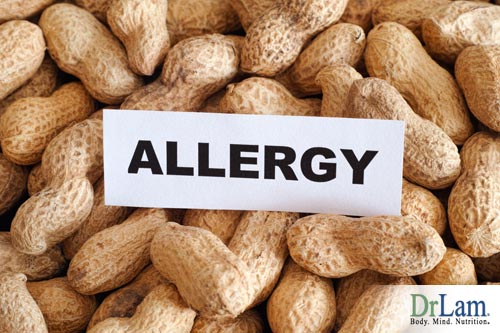 When the immune system in your body reacts to certain things in the environment such as you having an allergy to pollen, it causes an unwanted reaction. The hypersensitivity symptoms reactions that are felt in the body can be quite uncomfortable, they can cause damage to your body, and sometimes can even be fatal.
When the immune system in your body reacts to certain things in the environment such as you having an allergy to pollen, it causes an unwanted reaction. The hypersensitivity symptoms reactions that are felt in the body can be quite uncomfortable, they can cause damage to your body, and sometimes can even be fatal.
There a few different types of hypersensitivity symptoms that can be grouped up into four main categories.
The first type of hypersensitivity – and probably the one most people have experienced – is any sort of allergy. Allergies are quite common in the United States and around the world, affecting roughly one in three people at some point in their lives. There are many different causes of allergies, ranging from certain foods to bee stings to house dust mites. In certain scenarios, particularly in families, allergies can be one of the main factors that are related to the cause of asthma in children. The good news is, there is effective and preventative solutions available.
Allergies are a result of our body’s immune system reacting to substances in our environment that can be, in most cases, harmless to other people. The substances are allergens that can come in the form of insects, foods, medicines, pollen, pets and house dust mites. When someone with an allergy comes into contact with an allergen like pollen for example, they may have hypersensitivity symptoms such as hay fever, eczema, or asthma.
The second type of hypersensitivity symptoms have to do with antibodies. What are antibodies? They are tools used by our immune system to target and stop pathogens and viruses that have entered our bodies. The problem occurs when the immune system is confused and attacks its own cells instead of these bad pathogens that have entered our systems.
Immune complexes make up the third type of hypersensitivity symptoms, which are more complicated than type two. Immune complexes can be thought of as groups of antigens and antibodies that grow in specific tissue, such as our knee joints or kidneys. Antigens can be thought of as the bad stuff that enters our bodies – like viruses – that antibodies target. These clumps of antigens and antibodies grow to a size and cause inflammation in the affected area and are common to conditions such as lupus and rheumatoid arthritis.
The last group of hypersensitivity symptoms is classified as a “delayed” reaction. It does take a few days to kick in before anything happens, and an example commonly seen would be cases of poison ivy that cause a rash.
 Probably the most common form of hypersensitivity symptoms that can be experienced in our day to day lives is having allergies to food. We all love our food, whether it be cheeseburgers, cakes, ribs, salads or sandwiches, so it’s important to be aware of certain reactions some people may have to specific foods. Food allergies are known to affect quite a large number of our population, with estimates that about three percent of adults and up to eight percent of our children are affected.
Probably the most common form of hypersensitivity symptoms that can be experienced in our day to day lives is having allergies to food. We all love our food, whether it be cheeseburgers, cakes, ribs, salads or sandwiches, so it’s important to be aware of certain reactions some people may have to specific foods. Food allergies are known to affect quite a large number of our population, with estimates that about three percent of adults and up to eight percent of our children are affected.
When you have a food allergy, your immune system creates those antibodies we talked about earlier to target a certain type of food – like nuts. This causes the body to react with unwanted symptoms of hypersensitivity. The reactions happen quickly – sometimes within minutes – and can be quite serious or life threatening. These are known as food allergies; however, there is a much more common type of food hypersensitivity known as food intolerance.
Different from food allergies, with the key issue being that food intolerance is not caused by the immune system. They are believed to affect one in five adults in our population, and usually have a slower and more gradual progression when it comes to the appearance of hypersensitivity symptoms.
Food intolerance can occur many hours after eating the offending type of food, and the symptoms can also last quite long. These can range from: diarrhea, joint pain, night sweats, fatigue, skin rash, nausea, vomiting and other chronic conditions. With food intolerances, you may find that you can still eat some amount of the offending food, but when you eat too much of it, the symptoms of hypersensitivity start to appear. A couple of examples of food intolerance are being wheat intolerant or lactose intolerant.
In people who suffer from adrenal fatigue, their hypersensitivity and intolerances are worsened. In some cases, patients who show hypersensitivity symptoms may be misdiagnosed. If you have experienced any major stress in your life that has affected you emotionally, whether it be a loss of your job, career failure or loss of family, the stress you experience can lead to weakness of your adrenal glands. Our adrenal glands are in charge of releasing a hormone, known as cortisol, that is needed for the healthy function of our bodies by reducing inflammatory response.
If the adrenal glands are overworked with stress, they can become fatigued. This leads to inadequate cortisol being produced. Therefore, there is not enough cortisol to reduce the inflammation caused from reacting to the allergens.
In some scenarios, people who have adrenal fatigue may find themselves having more cases of allergies or allergic reactions, which seem to get worse with time. Histamine also gets released by our immune system in response to allergic reactions, and as the histamine gradually builds up, our adrenal glands have to work that much harder to produce more cortisol to reduce inflammation.
 If cortisol output falls, as in advanced stages of Adrenal Fatigue Syndrome (AFS), the body becomes more and more inflamed. Food sensitivity rises. It’s not that surprising that for those who have allergies to food or their environment (or both), through things such as peanuts or pollen tend to be experiencing adrenal fatigue as well.
If cortisol output falls, as in advanced stages of Adrenal Fatigue Syndrome (AFS), the body becomes more and more inflamed. Food sensitivity rises. It’s not that surprising that for those who have allergies to food or their environment (or both), through things such as peanuts or pollen tend to be experiencing adrenal fatigue as well.
It is this cycle – a vicious one at that – of reduced cortisol production and increased histamine being released, that inflames our organs and tissues. This leads to elevated levels of adrenal fatigue, along with more noticeable allergic reactions. So, it is essential that we support our adrenal glands as best we can by either removing or reducing the stressful factors in our lives and our exposure to the offending foods or allergens that cause our immune systems to react. Breaking the cycle will strengthen our adrenal gland function and reduce our symptoms of hypersensitivity.
The detoxification response within the NeuroEndoMetabolic complex, plays an important role in hypersensitivity. When our body’s ability to detoxify is not as good as it can be, it brings with it an imbalance in toxicity in our system. This can demonstrate itself through hypersensitivities that we have mentioned such as food and medication intolerance, as well as having an intolerance for nutritional supplements that you might take such as a multi-vitamin.
The body’s ability to detoxify is reduced when we experience stress that repeatedly weighs us down. Overloading our organs and systems with a workload that it is not equipped to deal with will bring down the efficiency to which these systems are defending the body against stress.
When our metabolism is interrupted from stress, the body responds very early on. Whether it is signs of having a sugar craving, the need to snack frequently, and/or having a larger waistline, all are clues that lead to your metabolic system being disrupted.
The problem with an interrupted metabolic response that is not fixed is that it gets worse gradually with time, and if the stressful factors in your life are not reduced or removed, you can suffer from symptoms that will affect your quality of life. These could present in your body in the form of hypersensitivity to supplements, an intolerance for your medications or supplements, or hypersensitivity to electromagnetic forces. All of these could make you feel like your life is less comfortable or ideal.
 Some long term sufferers may even be housebound at a point, due to the unchecked progression of the condition. The good news is only a small number of people will advance to this point, and you can avoid this by eliminating or reducing the stress you are experiencing in your life. It could be as simple as adopting some adrenal breathing exercises to help calm and soothe the body and mind in moments of stress. It could mean removing yourself from an environment that is stressful to one that is less stressful. This could be the place where you work or study or even where you live. Finding yourself an alternative option is best (if possible), or just giving yourself a break from that environment may work.
Some long term sufferers may even be housebound at a point, due to the unchecked progression of the condition. The good news is only a small number of people will advance to this point, and you can avoid this by eliminating or reducing the stress you are experiencing in your life. It could be as simple as adopting some adrenal breathing exercises to help calm and soothe the body and mind in moments of stress. It could mean removing yourself from an environment that is stressful to one that is less stressful. This could be the place where you work or study or even where you live. Finding yourself an alternative option is best (if possible), or just giving yourself a break from that environment may work.
The body clearly sends you messages that sometimes it’s long overdue for a break or maybe just wants to be left alone. These interruptions in our body’s ability to metabolise and detoxify are a signal to help us realize that the stress we are experiencing is overwhelming. Hypersensitivity, stress, and adrenal fatigue can walk hand in hand in a vicious cycle when any one part of it is left unchecked. It is our responsibility to honor our bodies respectively with consuming the right foods, avoiding offending foods, and reducing or eliminating the stressful factors in our lives.
